Something Wicked This Way Comes: Michael D. Langois and Flock Theatre’s Halloween ’13 Macbeth
I must confess.
I confess that I’m not sure I believe in confession, despite a semi-confessional blog style.
I confess that I don’t even really believe in Full Disclosure on blogs. I mean, they’re BLOGS. Whaddya need disclosure for? Come on!
But here I am, about to disclose.
Supposedly there is a chance I might feel guilty if I let you read this entirely fabulous interview all the way through and didn’t tell you that WAY BEFORE (like two whole weeks before) I ever interviewed Michael D. Langois, director of this year’s production of Flock Theatre‘s Macbeth, I also auditioned for the man.
Yea, even auditioned for THIS VERY PRODUCTION! GASP!
So what aren’t you going to get in this interview, dear Black Gaters?
You aren’t going to get a cool, calm, collected, impartial, disinterested, “Oh, so you’re doing Macbeth? How nice! Tell me about the play and its DARK MAGIC!” sort of interview-blog-article-thing.
(In fact, such an attitude would go against my aesthetic intentions for this “Fantasy and the Arts” series of interviews I’m doing.)
You’re going to get me.
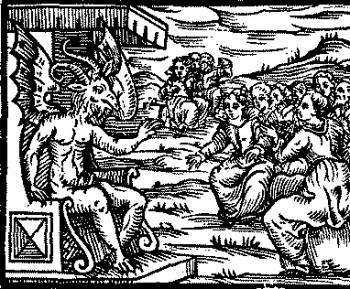 Who did not, at the time of this interview, know if she was even cast or not, who just wanted to talk about Shakespeare for an hour with someone who COULD. And who wanted (still wants) very much to play Macduff (because he’s the best character ever and fights Macbeth with nothing but a sword and a prophecy and then chops off his head and brings it to Stupid Malcolm, who I also wouldn’t mind playing) but who would be willing and happy to play, say, an old man, or a maidservant, or the doctor.
Who did not, at the time of this interview, know if she was even cast or not, who just wanted to talk about Shakespeare for an hour with someone who COULD. And who wanted (still wants) very much to play Macduff (because he’s the best character ever and fights Macbeth with nothing but a sword and a prophecy and then chops off his head and brings it to Stupid Malcolm, who I also wouldn’t mind playing) but who would be willing and happy to play, say, an old man, or a maidservant, or the doctor.
…Or a tree branch.
Michael laughs when I tell him this.
“We need tree branches. For the scene at the end when the forest moves. You’d be the first tree branch we’d ever carry in on a divan.”
Michael and I were co-actors in Flock Theatre’s summer production of As You Like It. He played a manic Touchstone. I played a manic Rosalind.
What I know about him as an actor is that he’s inexorably energetic, physically brave, can talk at the speed of lightning, and makes discomposing comments under his breath onstage that tend to crack up his eavesdroppers.
I don’t know much about him as a director, but I’ve heard rumors.
I also must confess (sigh) that I know NOW that I am in Macbeth.
Now, as I type this intro.
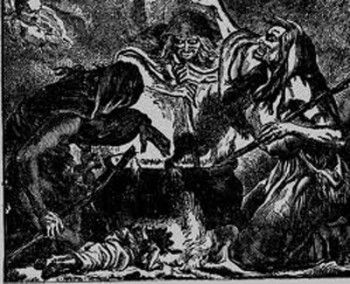 I am in Macbeth. MACBETH! I AM IN MACBETH!!! MAAACCCBEEEETHHHHH!!!
I am in Macbeth. MACBETH! I AM IN MACBETH!!! MAAACCCBEEEETHHHHH!!!
Sorry. I just get excited, is all.
I further confess that I STILL DON’T KNOW if I’m going to play Macduff. Probably not. Wrong plumbing, methinks, even for our gender-bent cast.
But for the first week of read-throughs and rehearsals, Michael has all of us (except for Macbeth and Lady Macbeth) in the ensemble reading everyone and everything, trying out weird voices, dialects, physicalities, that sort of thing. You know what he calls it?
“Playing in the sandbox.”
I did, in fact, get to read Macduff at our first read-through. I had my crack at it. And ye gods, did I chew it up and spit it out too. And it was delicious! And do you know what I found out? (This is a great detail. I must use it in something. You must too.)
Says Michael:
“Stage blood has a zesty mint flavor. I’m not kidding.”
I look forward to proving this hearsay before autumn’s out.
Now, without (much) further ado (about nothing), I give you my interview with Michael D. Langois, director, actor, playwright, teacher, and musician.
Directing Macbeth:
An Interview with Michael D. Langois of Flock Theatre
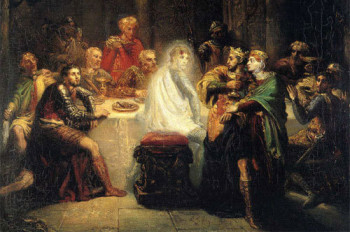 Have you directed MacBeth before?
Have you directed MacBeth before?
I have.
How many times?
Define direct.
You define direct!
Okay.
This will be Flock’s 11th year doing it.
Of the previous ten years, I’ve been involved on some level, some nine or ten times.
Of those nine or ten times, I’ve directed or assistant directed it five or six times. I stopped counting after the third.
Do you adhere to the superstitions of Macbeth?
No. The word gets said enough – I’ll say Macbeth in the theatre. I have no problem with that. Have we had difficult productions? Have productions had difficult moments where you start to wonder? Yeah.
But for the most part I don’t adhere to the superstition that terrible, terrible things happen to Macbeth.
…That being said, I do know that one of the superstitions is that productions who remove the character of Hekate, Queen of the Witches — those are sort of famed in song and story. When SHE’S removed.
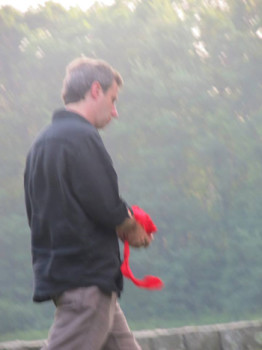
FABULOUS.
I’m not touching her stuff. She’s in. All of her stuff is right in all the way.
Do you have any idea where the superstitions came from?
Part of it is because Shakespeare’s use of witches and calling down the dark forces through the course of the play.
Part of it is because invariably…
He starts ticking these off on his fingers.
It has a lot of sword play, a lot of stage blood which can potentially make for a lot of messy, slippery surfaces, and in more modern contexts, is often done in a low-lighting atmosphere.
So when you combine swordplay, low lighting, slippery — bad things can happen. And invariably do happen. There are stories of swords slipping out of people’s hands and impaling audience members.
Whoa.
Michael holds up his hands, waving them and grinning.
Not us, not us. We’re good. And we’re insured!
When you add the human factor of actors who are hopped up and energized and their adrenalin’s pumping anyway — stuff is gonna happen.
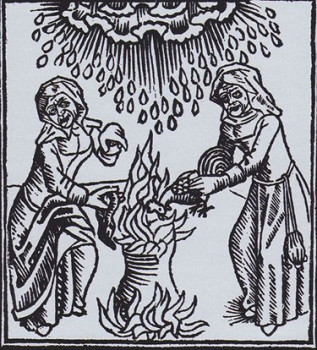 Can you tell me the weirdest thing that’s ever happened during one of your productions of Macbeth?
Can you tell me the weirdest thing that’s ever happened during one of your productions of Macbeth?
Jeff Latham — he’s an actor who’s done a number of things with us, from Rhode Island, actually — he was playing Macbeth one year.
At the student show, in the morning when they were running their fight call, he was a little bit unfocused and he fell off of the stage in his sword fighting sequence and he gashed his hand pretty well.
YIKES!
He wrapped it up, did the show, did the fight sequence, then went to the hospital and got stitches. And then came back for the evening show. So he was a trooper.
We’ve had our fair share of unfortunate events.
You’ve done it enough times that you’re thoroughly familiar with the text and the material. What do you want to do differently this time? What do you want to do that you’ve never done before with Macbeth?
In the past, we’ve banked an awful lot on large-scale spectacle. And human spectacle. Charges up the aisles before battle sequences. Large battle sequences. Twenty, twenty-five actors with swords all running and yelling and screaming and fighting.
I wanna hone the show down to its barest elements, its barest essentials.
We’ve worked the text before but I want to look at the text a little bit differently. I want to focus on the more horrible aspects — the human, horrible aspects of the play. And explore the supernatural elements that are there.
We’ve explored them, but… I want to see where a tight cast takes this element of the play.
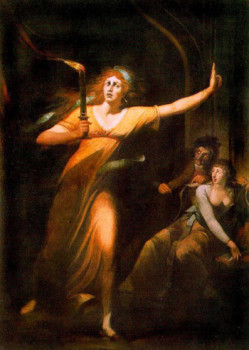 The meeting of supernatural and psychological horror?
The meeting of supernatural and psychological horror?
Exactly. And what happens when the supernatural meets, for lack of a better word, the natural world. What we know to be the natural world.
What’s the interplay? What happens?
Not that I’m one of these people who believes that everything is about power, everything is a power struggle throughout life; I don’t adhere to that philosophy. But I do think that sometimes when two very opposing forces meet, there is going to be a friction. A struggle. A power play.
I think — at least in the world of Macbeth (and maybe in this world; who am I to say?) — the supernatural and natural worlds are worlds that live side by side, run this parallel track, and rarely the twain shall meet.
So when the witches, who are clearly supernatural forces, meet Macbeth and Banquo, what happens? Who’s gaining the upper hand?
And what would have happened if they’ve never met?
When Lady Macbeth makes a conscious decision to tap into darker energy, the darker world, in order to get what she wants, does she have to give something up? Something of herself? What is she giving up? Is she just allowing herself to be a vessel? Is she giving up anything at all? When the darker energy enters her? When it becomes part of her?
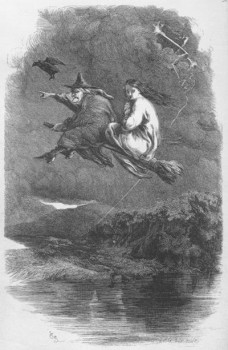 So you’re taking that literally? When she’s invoking the darker powers in the text, that is actually happening — it’s not a psychological moment; it’s a supernatural moment?
So you’re taking that literally? When she’s invoking the darker powers in the text, that is actually happening — it’s not a psychological moment; it’s a supernatural moment?
Right! One of the questions I want to explore is… Does she know that?
It’s sort of akin to someone saying, “I’d sell my soul to the Devil for a Snickers bar.”
A.) Would you really? And B.) Does the Devil take you up on your offer?
I guess it would depend on… Who’s playing Lady Macbeth? And if she’s making the decision, is this her religion? Is this her background? Does she know the rituals? Does she know the correct sacrifices?
Exactly!
And I take it — my personal take on it, and I’m willing to explore all different aspects of it in rehearsals — my feeling is, she thinks she knows what she’s saying. She thinks she knows what she’s doing. But like a lot of human beings, we make these bargains, we make these deals, thinking we know full well what we’re getting ourselves into. And we have no idea.
She’s making a conscious decision to do this. And she’s doing it in 11th century Scotland. That’s a conscious choice. That was a belief system. When Shakespeare wrote, witches were still a part of natural life.
They were still being hung. A hundred years later they’re hanging them in the colonies. This was written during the reign of King James. King James wrote a book on how to discover witches. Witches were still a very real force in this world.
So I’m of the opinion that Shakespeare knew what he was doing when he wrote that. He was having her make a choice. Did she know full well what that choice really meant? That’s debatable. But I think in that world, in that context, witches were real, the dark world was real, and people knew enough to tread lightly in that world.
So to make a choice like that was a choice.
Shakespeare invokes pagan gods all the time, like Jove. But they’re not always dark forces, or treated as devils, like Hecate and the Weird Sisters. What do you think he’s doing?
I don’t know what he’s doing! I do know that the invocation of Jove actually came from a really bizarre, obscure Elizabethan law that Shakespeare was having a lot of fun with.
Okay?
You start to see Shakespeare’s use of Jove a lot more in middle-later plays. Right around the same time that the Puritans were getting a little bit more of a Parliamentary foothold, a little more of a power hold, and they were starting to create laws — or at least float laws — that you could not say the word “God” on stage.
We’re talking a few years before they shuttered the theaters altogether.
So Shakespeare was basically saying, “Oh, if I can’t say God, I’ll say Jove.”
Michael thumbs his nose at invisible dead Puritans.
But as for what Shakespeare believed — I don’t know what he believed. He’s such a nebulous figure anyway. But there is beginning to be more and more evidence that in a Protestant world, he was actually fairly… Catholic.
Which I think is fascinating. Not that the Protestants were all that different than the Catholics other than, “We don’t want the Pope. Oh, and I want to get a divorce.”
I know that he was a man of his time, and in that time that belief system of having the potential for evil in a very human form was a real belief.
It is interesting he didn’t invoke Satan or Lucifer, but he did invoke dark female underworld gods.
Yes, and then there’s the Weird Sisters as the whole Mother, Maiden and Crone thing.
Have you ever cast them like that?
We have in the past. This year I’m playing with a lot of things. There’s a portion of me that — at least early in the rehearsals — may actually never want to see them. Ever.
COOL!
Essentially, I’m thinking of having the entire cast voice them. And never have them actually physically appear.
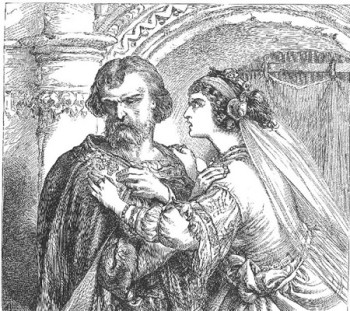 Like Banquo and Macbeth are seeing them, but we have to imagine them?
Like Banquo and Macbeth are seeing them, but we have to imagine them?
Or maybe they’re not even seeing them!
But don’t they have that line about seeing the witches as women with beards?
But is it something where I like everything else so much that I just… nip that line a little bit?
I don’t like cutting a lot of Shakespeare, but by the same token, if it serves my damned ends…!
Especially if it serves a creepier end.
I won’t do it if it’s awkward or weird. But if it works — if it raises the hackles a bit — then I’m all for it.
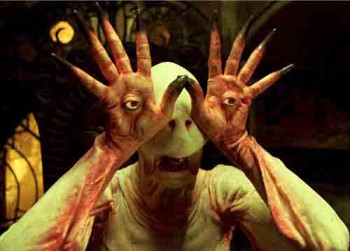 I once attended a panel about building monsters at the World Horror Convention in Toronto.
I once attended a panel about building monsters at the World Horror Convention in Toronto.
The panelists were all people who built monsters for movies, or painted covers for horror novels, or created them on the computer.
And they were talking about Guillermo Del Toro, and the reasons why the monsters in his films are so frightening.
They said it was because he’s always asking himself, “What scares the hell out of me?” Then he creates his monsters to scare himself, and gives them back to us. Which is… truly scary.
And I know that you’re asking your ensemble of actors, “What do they fear?”
So I wanted to ask you, “What do you fear?”
I don’t know!
THAT’S NOT FAIR, MICHAEL
It’s not fair. That’s why I’m the director!
That’s not to say that I don’t have fears and I’m not willing to put those fears out there on the table. It’s just… I honestly don’t know what fears I’m exploring.
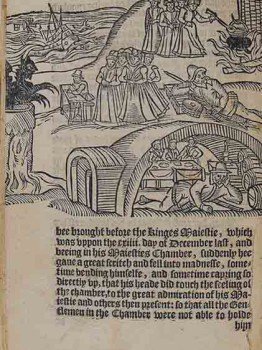 Well — invisible voices seem to be one of them?
Well — invisible voices seem to be one of them?
Invisible voices… I have known a number of people with schizophrenia. That’s frightening. That’s awful. That is an absolute true fear.
There is the logical part of me that thinks if I don’t see someone, and I’m hearing a voice in my head, then I should be able to cognitively say, It’s not there, and shunt it off, push it off to the side.
I would love to be able to say that I could do that.
I couldn’t do that.
And I know I couldn’t do that. Not being sure of what’s real is a scary thing.
And that’s a core question of Macbeth. Would these people have killed the king anyway, without the prophecy?
Absolutely. It’s also a question that Macbeth and Banquo ask right after the witches. When the witches disappear – and they disappear, “what seemed corporal melted, as breath into the wind” – one of them asks:
“Were such things here as we do speak about?
Or have we eaten on the insane root that takes the reason prisoner?”They’re immediately questioning their own reality. Their own sense of what’s real and what’s not.
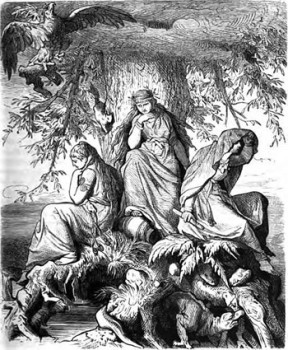 And then Macbeth bases all his actions on something he’s not even sure about.
And then Macbeth bases all his actions on something he’s not even sure about.
Right.
AH!
And what’s fascinating about Macbeth as a character, is that he is a soldier. He is a hero and he is a soldier.
And soldiers have orders.
Take that hill. Kill that man. Do this, do that.
And Macbeth is great at that. He’s great at following the order, going above and beyond. He lives in in a very concrete world, where you have an objective and you obtain the objective and that is that. Period. Done.
So when things don’t factor into that objective, in a real, tangible, concrete way, how does he react? How does that effect him?
He doesn’t make his best decisions?
He does and he doesn’t. There are a number of times early in the play when he says he’s making a conscious decision to not kill the king. He says a number of times, “I’m not gonna do this, I’ve made my decision, no.”
And then, enter Lady Macbeth.
Who then invokes the dark powers?
I don’t think she’s throwing the dark forces on to him. But she’s doing whatever she needs to do, whether it’s from whatever she’s invoked, or just her understanding of this man that she’s married to, to get him to do what she wants him to do.
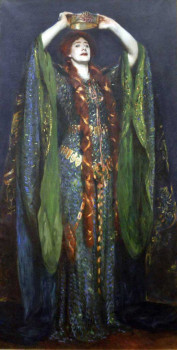 And she gives him his objective. Follow this order.
And she gives him his objective. Follow this order.
…And the way she gets him to follow this objective is to question his manhood. To question whether or not he is a real man. At one point she even says, “What, a soldier and afeared?”
She questions the thing that he is.
I think we all on some level have something that we think we are. We identify ourselves as a musician, an artist, an insurance salesman. you name it. A title’s not just a title. It’s who we are at some level. And she immediately goes for that core of his. And uses it against him. Uses it for her purpose. Under the auspices of his purpose.
I remember you saying once, about language, that you despised modern slang like “Awesomesauce” and “Amazeballs.” What other modern terms do you hate? And what are some of thing things — lines, portmanteaux — from Shakespeare that move you?
In terms of modern language, I hate how lazy we’ve become. As a society. Greater minds than mine can explain why we have become lazy. Whether it’s due to texting, Facebook, Twitter, who knows what?
I say that with the understanding that (I don’t tweet; I’m not a twit…terer…) it can be a legitimate — potentially — literary art form. I really do believe that a good writer can, in however many characters, complete some good work.
Like Haiku!
Yes, I was just going to say. You have this very short small space, and you can create some remarkably moving stuff. So I don’t want to dismiss that.
But you only have to look, a hundred fifty years ago, a grunt — a grunt private in the Civil War. And you pull a letter from him that was sent home, or a diary entry. And these letters and entries, they use imagery. There is metaphor. There is simile. You will find beautiful letters from crudely uneducated people.
You look at stuff that we write today… First of all, we don’t send letters anymore.
Thank God!
But even email… Another example is — and granted these were educated people — the letters from John Adams to his wife, and vice versa.
He’d always start with a phrase like, “My Dearest Friend.”
We’ve gone from a phrase like “My Dearest Friend,” to “Dear Whomever,” to “Chris,” to “Hey,” “Yo,” or sometimes we don’t even do the greeting.
And I’m just as guilty. We’ve lost the beauty of language. The beauty of words. And how they can move a person.
And also — and this is awful to say — but also quite frankly how they can manipulate people.
HA!
I mean, a well-written, well-phrased letter — even an email — can sway an argument if people are used to “Yo.” If you can phrase something beautifully, you can change someone’s mind. You can change someone’s outlook. You can make someone’s day, you can destroy someone’s day.
By the use of words. By the use of a comma. In the right place or the wrong place.
And we don’t take the time. It’s type type type type type. Maybe I’ll spell check it. Maybe I won’t. Because now “srsly” is a word. Surrussly. I don’t even have to use vowels anymore. And there it is.
If you add thirty more seconds to write something, then add five seconds to that just to look it over, you can change someone’s day.
Long story short, that’s what drives me crazy about modern language. As you can tell.
And then Shakespeare comes along…?
Shakespeare made up words! You used “awesomesauce” as an example of a made-up word.
I hate that word. I don’t know why I hate that word…
You don’t like the assonance?
I don’t. I really don’t.
But Shakespeare comes along and he invents thousands of words. He wasn’t above creating his own version of awesomesauce. Because he wasn’t. He did.
But here’s a man who knew the power of words. He also knew — and this is just as important in terms of writing a language or speaking it — he also knew the power of silence.
Because in his theatre, they didn’t have six weeks, eight weeks, ten weeks to rehearse a play. It was, “Here’s your script. You have maybe two weeks if you’re lucky. Memorize it as best you can and go.”
So he had to put clues into the text for actors. He knew the power of silence. He knew when the words didn’t need to be said. And that, I think, is just as powerful.
He knew how an O — just that letter, O — can be moving. Can hook your audience. Make you listen. Force you to listen. If it’s in the hands of someone who knows what they’re doing.
(So, later, when I was typing this, I had to go and look up some lines that began with “O.” Here are a few of my favorites.
* O brave new world that has such people in it.
* O, I am fortune’s fool!
* O, beware my lord of jealousy, it is the green-eyed monster which doth mock the meat it feeds on.
* O Julius Caesar, thou art mighty yet!
* O then unfold the passion of my love
* O, speak again, bright angel!
* O trespass sweetly urged
* O how I love thee! How I dote on thee!)
Michael has his “O” picked out and ready. His is the prologue from Henry V — which happens to comprise the entire “About You” section on my Facebook Profile page.
O for a muse of fire that would ascend the brightest heaven of invention!
Just a letter.
And it’s an exclamatory letter. Very rarely will he go “Oh.” It’s just O. And I’m convinced it wasn’t just because “I’ve got to fit it into ten syllables for this line.”
Later on in his life, he broke his own rules all the time. You only have to see how difficult it is how to memorize the lines in the later plays. Comedy of Errors and Midsummer Night’s Dream are some of the easiest lines to memorize.
You get to Julius Caeser, you get to The Tempest, he’s all over the map. Because he’s breaking his own rules.
You asked some of my favorite lines… Whenever I’m asked my favorite anything, I always balk. But!
One of my favorite lines is from Julius Caesar.
It’s called the 10th Scene. It’s well after Caesar’s dead. They’re about to go to war with Mark Antony’s forces. Brutus has accused Cassius of taking bribes. And Cassius rips into him.
And Brutus goes, “Let’s go into my tent and talk about this. ”
And they just lose it. It is the best argument scene you’re going to find in dramatic literature maybe ever. It is amazing. They accuse each other of all these horrible, horrible, horrible things.
And one of the lines Brutus says to Cassius:
“By the gods,
You shall digest the venom of your spleen,
Though it do split you.”And just the P’s and L’s and T’s. As an actor, you don’t have to do anything more with that line but speak the words properly.
And that is powerful. When the words do the work for you.
***
MACBETH SHOWDATES
Friday November 1st, 8 PM
Saturday November 2nd, 7 PM
Sunday November 3rd, 7 PM
Special school performances before and after the run TBA.
Performances will be in the basement of Saint Mary’s Star of the Sea Catholic Church in New London, CT.
Flock Theatre’s Mission Statement:
“Flock Theatre is a professional, not-for-profit theatre company committed to working with any community into which we are invited and through original, collaborative and educational efforts, to find the theatre that best suits the needs of that community. This artistic mission requires a resident ensemble performing for all ages, nationally and internationally and offering educational services in our art.”
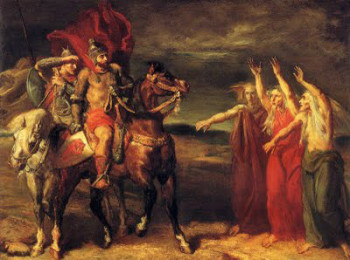
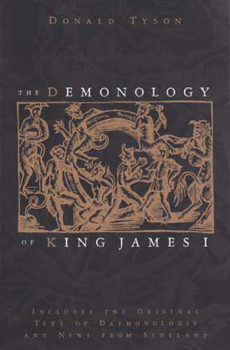
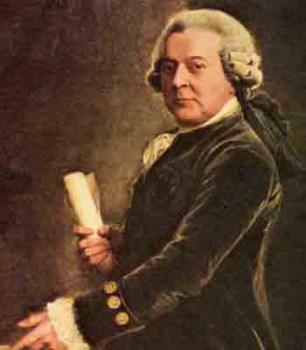
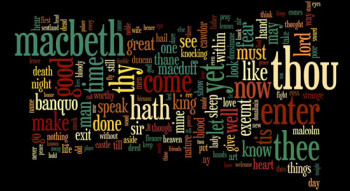
[…] then, as I began this series of Fantasy and the Arts Interviews (1 and 2 here and here), I knew immediately I wanted to interview […]